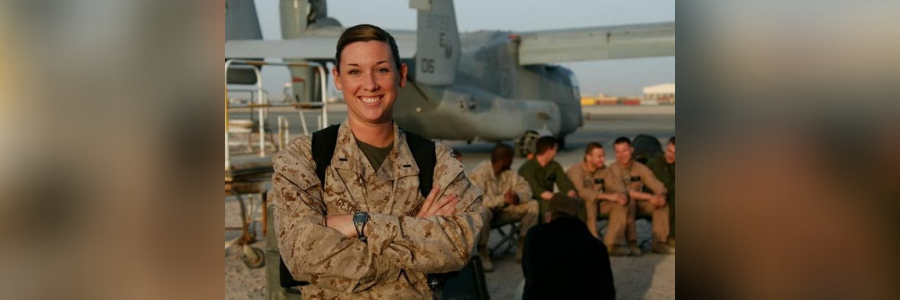JMS Professor and Alumni Explore Framing Theory and Marine Corps Policy Change
Their research analyzes how language and framing impact public perception of the Marine Corps and the organization’s policy change allowing women in combat roles.

Major Cassandra Stanton
by Aleah Jarin
February 2, 2021
In 2013, the U.S. passed legislation requiring all branches of the military to allow females to take on combat jobs. Prior to this, men had access to more infantry-related jobs such as combat engineering, artillery, and intelligence.
Public Relations Professor and Coordinator of the JMS Military Public Affairs Officer Master’s Program, Dr. Kaye Sweetser, JMS alumna Major Cassandra Stanton, and Doctoral Candidate and Public Relations Instructor from the University of Florida, Kalyca Becktel, recently co-authored a study testing the impact of media framing on the public perception of this change.
Their current research study is titled Policy aside: A framing study on policy change and its influence on the perception of an organization’s culture, seeks to examine how framing gender integration might affect the public’s attitude about the reputation, credibility, and characteristics of the Marine Corps.
An earlier version of the study was presented at the International Public Relations Research Conference in 2017 and won the Big Jack Award.
Becktel and Stanton, along with co-authors retired Major Justin Smith and Major Caleb Eames, studied public relations at the School of JMS to earn their master’s degrees and were enrolled in Sweetser’s research method course in 2016.
This new Marine Corps policy change became the premise for the group’s scholarly research paper assignment which turned into an academic journal article.
Stanton, a public affairs officer for the Marine Corps and graduate student at Command and Staff College, Marine Corps University, said her colleague Smith came up with the idea to test how the public was viewing this new change and how well the Marine Corps was communicating it.
“All of our bootcamps were changing, the infantry officer courses and all the classes that were before all-male, now had to figure out ways to integrate females in a safe, correct way,” Stanton said.
“There were public opinions on both sides about whether or not women should be in combat, whether or not they could be, and how it would affect the unit as a whole.”
The experiment consisted of presenting the same article describing women attempting the Infantry Officer Course (IOC) training, the course women have to pass in order to lead in combat, to three groups. However, each group was given a variation of that article demonstrating either a positive, negative, or neutral frame.
The first group received an article titled “One out of every 10 female officers pass tough infantry course,” showing a positive frame by the media. Another group was shown a negatively-framed article titled “Nine out of every 10 female officers fail tough infantry course.” The last group, or control group, looked at a neutrally-framed article titled, “Female Marine to attempt tough infantry course.”
Becktel, the lead author of the study, said the key takeaway from this research is the importance of language.
“We need to be very cognizant of what we say, how we say it, and understand that our language can be destructive or empowering,” Becktel said. “We can really blossom into studying language and how we can use that language to really be inclusive, not only as a Marine Corps and organization but as a nation.”
“Ultimately at the end of the day, we want the American public to believe in the Marine Corps and to believe in the work we’re doing…so we need to understand how our words are impacting our audience and how they’re affecting thoughts, actions, and behaviors towards the Marine Corps,” Stanton said.
Sweetser said the most fulfilling part about contributing to this research was “working with these brand new scholars and helping them through their research journey.” She also acknowledged the importance of SDSU graduate research.
“The opportunity at SDSU to work with graduate students and to help them through their own scholarly journey is amazing,” Sweetser said. “This article and other articles we’ve done with our graduate students, just go to show the quality of work they are producing as scholars is just as high as needed to get into the academy.”
Becktel added, “research is impactful, and it is something that can pave the way for change. Academic research is applicable to real-life and so I think we really need to hone in on research and what it can do to better everyone’s lives.”
Visit the School of Journalism and Media Studies website for more information about their graduate programs.
The content within this article has been edited by Lizbeth Persons.
More PSFA Stories